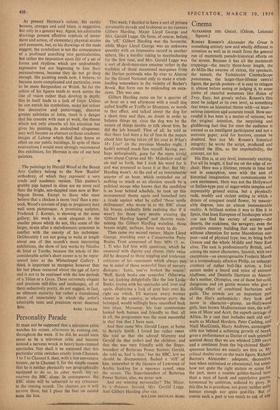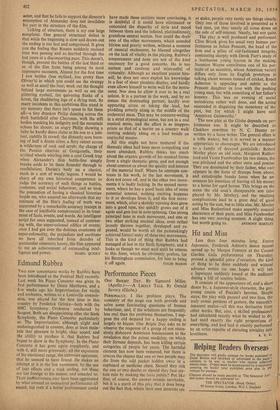Cinema
ROBERT ROSSEN'S Alexander the Great is something entirely new and wholly different in intention as well as in result from the general run of mammoth pseudo-historical efforts on the screen. Because it has all the mammoth trappings—the nearly three-hour length, the de-Mille-like swarms of extras, the spectacle, the tumult, the Technicolor CinemaScope panoramas, the larger-than-lifesize central figure, the garish posters—it is easy to relegate it, almost before seeing or judging it, to some limbo of cheerful nonsenses like Helen of Troy. Easy, but grossly unfair. Rossen's film must be judged at its own level, as something that treats an historical theme with—at least— serious intention and accurate result. How suc- cessful it has been is a matter of opinion; but the original intention, the surprising and gladdening fact that for once the audience is treated as an intelligent participator and not a moronic gaper, avid for horrors, cannot he doubted. Nor can Mr. Rossen's historical integrity; he wrote the script, produced and directed the film, so the responsibility, the concept, are his.
His film is, at any level, immensely exciting. For all its length, it had me on the edge of my chair. Here was a lifetime, remote in time but not in conception, seen with the sort of historical imagination that communicates its own excitement. Here was not the Hollywood or Italian-type past of sugar-white temples and impeccably grimed extras, but a physically rude, muddy and violent setting in which a dream of conquest could flower, by measur- able degress, into an almost immeasurable reality. A brilliant notion it was to film it in Spain, that least European of landscapes where you can find the variety of scenery—the deserts, the rockiness, the savagery, even the primitive country building that can be used without alteration for some Macedonian out- post—and of physical type, too, to bring both Greece and the whole Middle and Near East alive. The cast is predominantly British, and, among the minor characters, Spanish, with two exceptions—an unrecognisable Frederic March as a tremendously effective Philip, an unhappy creature of rather bull-like action, a foxy nature under a beard and voice of extreme bluffness; and Danielle Darrieux as Alexan- der's mother, Olympias, one of those hot-cold, dangerous and yet gentle women who give a chilling effect of combined barbarism and guile. The crowds are an important part the film's authenticity : they look and move in character—plump, un-Hollywood girls, lean brown Mediterranean men, the soft-. ness of Moor and Arab, the superb carriage of Africa. In a cast that includes such old stal- warts as Michael Hordern, Peter Cushing, and Niall MacGinnis, Harry Andrews, unrecognis- able too behind a softening growth of beard, gives a performance as Darius of such splendid scented decay that we are whisked 2,000 years and a continent from the big-chinned Shake- spearean hearties we usually see him as. My critical doubts rest on the main figure, Richard Burton's Alexander: adequate, decorative, best when minimised or obsessional, but some' how not quite the right stature or scope for the part, more a routine golden-haired hero than a man of harsh and superlative genius, tormented by ambition, seduced by glory. !I' this film he is grandiose, not great; neither cluitc,. human enough nor quite god-like. But 01 course such a part is too much to ask of anY
actor, and that he fails to support the director's conception of Alexander does not invalidate his part in the structure of the film.
Talking of structure, there is my one large complaint. One general structural defect is that while the beginning is slow and drawn-out the ending is too fast and compressed. It gives you the feeling that Rossen suddenly realised time was passing and so hurried through the last years at a disconcerting pace. This doesn't, though, prevent the battles of the last third or so of the film from being among its most impressive moments. Almost for the first time I saw battles (less stylised, less pretty than Olivier's) in which you could see the strategy as well as smell the fear; work out the thought behind large movements as well as sec the glittering eyeball, the quivering flanks of a horse, the shuddering legs of a dying man. So many incidents in this ambitious film stand in my memory that there isn't space to list them all—a tiny drunken Philip dancing across the dark battlefield after Chcronea, with the still bodies mocking his indignity and the mountain echoes his shouts; an angry Philip showing a baby he hardly dares claim as his son to a jubi- lant, ruddily lit crowd; the distantly seen burn- ing of half a dozen cities, a fiery sunset across a wilderness of rock and scrub; the charge of the Persian chariots at Gaugamela, their scythed wheels whirling into a cool Greek trap when Alexander's thin battle-line simply breaks aside to let them flounder through to annihilation; Darius's body on a chariot, stuck in a sort of weedy lagoon. I would be chary of my own historical competence to judge the accuracy of such things as battles, costumes, and social behaviour, and so took the precaution of having a classical historian beside me, who assured me afterwards that my estimate of the film's feeling of truth was
supported by a remarkable accuracy (except in
the case of justifiable compression) in its treat- ment of facts, events, and words. An intelligent
script for once supported, instead of contrast-
ing with, the super-colossal edifice of events; once I had got over the dubious overtones of super-colossality, the prejudices and snobisme we have all inherited from decades of spectacular cinematic hooey, the film appeared to me an achievement of outstanding intel-



































 Previous page
Previous page